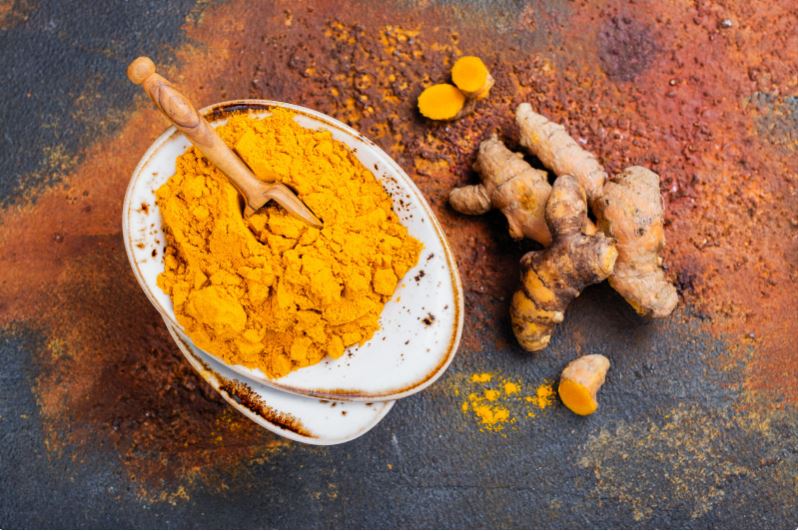Turmeric - The Powerful Spice for Your Hormones
Turmeric is one of my absolute favorite medicinal foods which can also act as powerful medicine. For women of any age (and men too, for that matter!), turmeric is an antioxidant-packed addition to add to your morning smoothie, dinner curry, or made into a delicious mid-afternoon drink (I won’t leave you hangin’, I do have a super yummy, easy recipe at the end of this article for you to try!).
Turmeric is a rhizome that grows under the ground like ginger. In fact, it looks a lot like ginger root, except for its rich, bright orange color and also tends to be a little smaller in size. The use of this spice originated in Southeast Asia, where it is a vital component for traditional curries. Most grocery stores carry the dried, powdered form of turmeric in the spice aisle. And, most larger health food stores will also carry fresh turmeric root, which is amazing to cook with if you’ve never had the chance yet.
This powerful spice contains an amazing anti-inflammatory, detoxifying, and antioxidant compounds. The most widely known of these compounds is called curcumin. This bioactive compound is around 3-7% (by weight) of turmeric. Curcumin has been studied like crazy for its health benefits.
Health Benefits of Curcumin
There are dozens of clinical studies using turmeric and curcumin extract (which is way more concentrated than ground turmeric). Some of the conditions this spice has been studied in treating are menstrual problems (PMS, painful and irregular cycles), headaches, stomach pain or bloating, depression, joint pain and arthritis, liver problems, IBS (irritable bowel syndrome), Crohn’s disease, fibromyalgia, skin issues, diabetes, and much more.
Curcumin contains anti-inflammatory and pain-relieving compounds. It fights inflammation at the molecular level, decreasing the neurotransmitter responsible for pain, called neuropeptide substance P. Some studies even show it can work as well as certain anti-inflammatory medications (but without the side effects).
Curcumin is also an antioxidant compound, protecting our body from oxidative stress. It boosts our natural antioxidant enzymes, which neutralize free radicals, further protecting our cells from damage.
Curcumin has other amazing functions too:
Boosts our levels of "Brain-Derived Neurotrophic Factor" (like a natural growth hormone for your brain), which is great for brain health.
Improves endothelial function” (the inner lining of our blood vessels), which is great for heart health.
Reduces growth of cancer cells by reducing angiogenesis (growth of new blood vessels in tumors), metastasis (the spread of cancer), and even contributes to the death of cancer cells.
Turmeric for Hormone Balance & Fertility
There are three key properties which make turmeric so amazing for both hormone balance and enhancing fertility: anti-inflammation, antioxidant, and liver detoxification. All three of these elements can treat underlying factors for hormonal imbalance and fertility issues.
For most hormonal imbalances, there are a set of underlying factors which can be contributors to these issues. These are things like chronic stress, how our genes are expressed (either positively or negatively), oxidative stress/free radical damage, chronic inflammation, telomere shortening and decreased immune system response. Whew, that’s a mouthful, right? Now, why these underlying factors may be present in the first place is a whole other blog about how we eat, move, love, and stress – I’ll save that for another time. But what if there was a medicinal food available which is able to actually positively affect all of these underlying factors? You guessed it, that’s turmeric and curcumin.
For our hormones to be in balance and running optimally, we need antioxidants from the food we eat or the supplements we take. As discussed above, antioxidants are necessary in protecting our body against some of the deleterious effects of what we eat, our environment (the air, the products we use in our home, the products we use on our body, our stress levels, our sleep, etc. – if these things are not optimal. Antioxidants can also prevent aging at a cellular level, and this includes preventing damage to our egg health which can impact fertility (see my article on the use of coQ10 here for women trying to conceive.
Another positive aspect of using turmeric to improve fertility is that turmeric may be helpful in improving our biological age. Our biological age is different than our chronological age (the age on our driver’s license) and takes into consideration many factors which include our diet, stress, exercise and other lifestyle factors which literally age us or keep us young. When we have a lower biological age, we set ourselves up for more success with getting pregnant at a later chronological age. One marker of our biological age is called a telomere. A telomere is the end cap on our DNA which affects cellular aging. The shorter the telomere, the more health risks are present that come with aging, including infertility. In fact, telomeres have been studied as a marker for male infertility. New research has also found that curcumin not only can stop telomeres from shortening, but can also protect and lengthen your telomeres, which is basically turning back your biological clock!
Besides its potent antioxidant and anti-inflammatory properties, turmeric also aids the liver in detoxification of hormones. It has been shown to aid in phase 2 liver detoxification, which helps in removing unneeded hormones and other toxins from the body. And, it also may even regenerate liver cells.
Turmeric and curcumin may especially be helpful in conditions such as painful menstrual cycles, PCOS, hormonally related headaches/migraines, endometriosis, uterine fibroids, ovarian cysts, and auto-immune conditions such as Hashimoto’s.
How to Get the Most Out of Taking Turmeric
Curcumin is not easily absorbed by your gut. For one thing, it’s fat soluble. So, as with fat-soluble nutrients (like vitamins A, D, E, and K), to increase its absorption take with a healthy fat-containing meal like nuts/seeds, olives, or avocados.
The second trick to get the most out of your turmeric is eating it with pepper. Interestingly, a compound in black pepper (piperine) enhances absorption of curcumin, by a whopping 2,000%!
To use turmeric and curcumin medicinally, you’ll need a larger dose than just cooking with it in your dishes. This is when taking curcumin or turmeric in a supplement form is beneficial.
Before taking a curcumin supplement, be cautious and speak with your healthcare practitioner if you:
Are pregnant
Are taking anti-platelet medications or blood thinners
Have gallstones or a bile duct obstruction
Have stomach ulcers or excess stomach acid
Turmeric/curcumin is an amazing medicinal spice that can also act as a potent hormone balancer and fertility promotor.
The anti-inflammatory, liver detoxification, and antioxidant properties can help support our hormones balance and fertility, and reduce the effects of aging on our body.
What’s your favorite turmeric recipe? Although I use turmeric in my morning smoothie and in curries a lot, I really love to also drink it. Try my version of “golden milk” below and let me know in the comments below what you think.
Are you a woman trying to naturally balance your hormones and looking for help? Book a FREE Hormone Balance Breakthrough call with me here. I’d love to help you get started!
Recipe (turmeric): Golden Milk
Serves 2
2 cups of organic almond, hemp, or other nut milk
1 ½ tsp turmeric, ground
¼ tsp cinnamon, ground
½ tsp honey
Instructions
Add all ingredients to a small saucepan. Whisk to combine.
Warm over medium heat, whisking frequently. Heat until hot, but not boiling.
Serve & enjoy!
~~~~~~
Are you a woman trying to get pregnant and looking for more personalized guidance and support into natural ways to increase your fertility? Book a FREE Fertility Audit call with a member of our team here.
References:
http://www.precisionnutrition.com/encyclopedia/food/turmeric/
https://authoritynutrition.com/top-10-evidence-based-health-benefits-of-turmeric/
https://examine.com/supplements/turmeric/
https://leesaklich.com/foods-vs-supps/foods-vs-supplements-the-turmeric-edition/
https://nutritionfacts.org/video/turmeric-curcumin-plants-vs-pills/
https://nutritionfacts.org/video/who-shouldnt-consume-curcumin-or-turmeric/
Xiao Z, Zhang A, Lin J, et al. Telomerase: a target for therapeutic effects of curcumin and a curcumin derivative in aβ1-42 insult in vitro. PLoS One. 2014 Jul 1;9(7):e101251.
https://www.ncbi.nlm.nih.gov/pubmed/29609488

